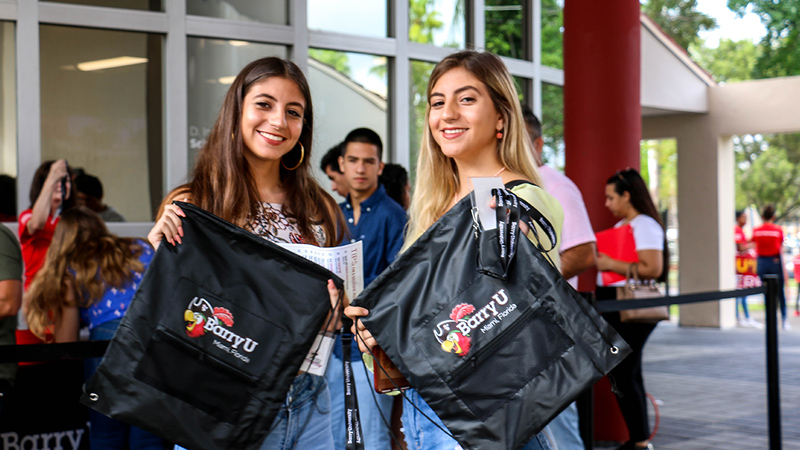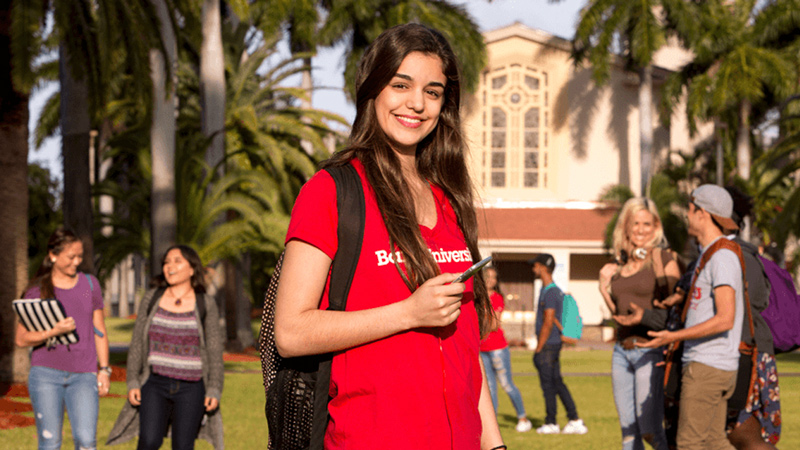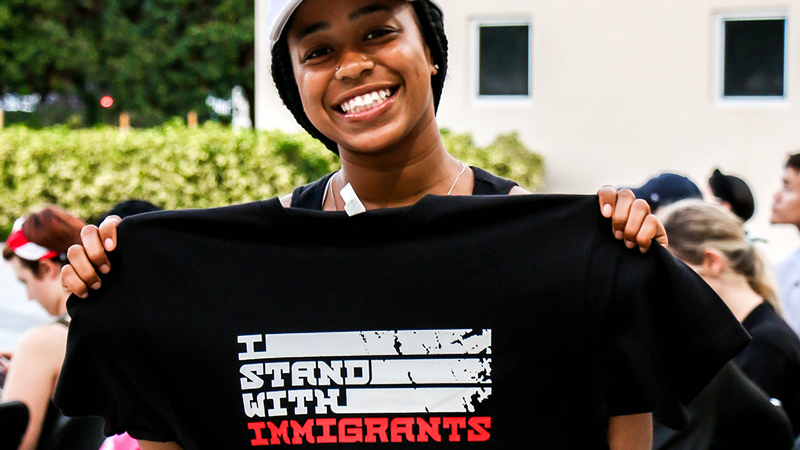Community Engagement News October 3, 2022
GEARING UP FOR MIDTERM ELECTIONS

The Florida Ballot Forum and other National Voter Education Week activities are organized as part of the Campus Democracy Project, with support from the Students Learn Students Vote Coalition through an “Ask Every Student” grant.
The Florida Ballot Forum, Barry University’s major event for National Voter Education Week, will take place this Wednesday (Oct. 5). The hour-long event will help students and other voters make informed choices in the midterm elections.
Scheduled for 3 to 4 p.m., Wednesday’s forum will take place in Room 110, the Events Room, of the Landon Student Union and will put the spotlight on proposed amendments to the Florida Constitution.
A representative of the League of Women Voters is expected to present and lead the discussion of the three constitutional amendments that are on the November ballot in Florida. The amendments were proposed by the Florida Legislature.
The League of Women Voters is “a nonpartisan, grassroots organization working to protect and expand voting rights and ensure everyone is represented in our democracy.” The organization—which is not restricted to women—seeks to “empower voters and defend democracy through advocacy, education, and litigation, at the local, state, and national levels.”
Organized as part of Barry’s Campus Democracy Project (CDP), the forum will also call attention to specific congressional, statewide, and county/municipal races in Broward and Miami-Dade.
Midterm elections in the United States are the general elections that are held near the midpoint of a president’s four-year term of office. The 2022 elections will be held on November 8.
During this midterm election year, all 435 seats in the House of Representatives and 35 of the 100 seats in the Senate will be contested. Thirty-nine state and territorial gubernatorial elections, including Florida’s, as well as numerous other state and local elections, will be contested.
National Voter Education Week (Oct. 3–7) is an occasion to help eligible voters bridge the gap between registering to vote and actually casting a ballot. “During this week of interactive education, voters have the opportunity to find their polling location, understand their ballot, make a plan to vote in person or remotely, and inspire others to get involved,” the organizers say.
The Students Learn Students Vote Coalition recently awarded a $5,000 “Ask Every Student” implementation grant to Barry University through the CDP. The grant is being used to support CDP activities this semester.
Ask Every Student is “a national joint initiative that facilitates collaboration between campus leaders and nonprofit partners to help campuses ask every student to participate in the democratic process and achieve full student voter registration.”

The National Study of Learning, Voting, and Engagement (NSLVE) found that 58.4% of registered Barry students voted in the mid-term election of 2018.
For the most recent midterm election, in 2018, nearly 75% of Barry students eligible to vote were registered to vote, a study found. The National Study of Learning, Voting, and Engagement (NSLVE) found 43.7% of eligible Barry students and 58.4% of registered Barry students would actually vote that year.
Throughout this week, there will be several voter education activities on campus and on social media. CDP Committee representatives will assist with voter registration, provide information on voting options, and distribute voter guides.
Under the aegis of the CCSI, the CDP is a nonpartisan project designed to promote civic learning and democratic engagement through voter registration, education, and mobilization.
Registration for Orientation Component of Service-Learning Modules Remains in Progress


Bread for the World organizes the Racial Wealth Gap Learning Simulation and the Offering of Letters to Congress, which are included in the Food Security module.
Four service-learning modules are being offered this semester, and registration for the orientation component remains in progress.
The modules are listed as Food Security, People Power, Supporting Refugees and Displaced People, and Youth Development. Each module addresses a specific social issue.
The Food Security module emphasizes the need for people to have access to enough food for an active, healthy life. Students will support local, national, and global efforts to address food insecurity and end hunger. Such efforts are being made by Bread for the World, “a Christian advocacy organization urging U.S. decision makers to do all they can to pursue a world without hunger.”
Bread organizes the Racial Wealth Gap Learning Simulation, which will be offered to Barry students on October 5 and October 29. The organization also organizes the Offering of Letters to Congress, which will be an advocacy project for students enrolled in the Food Security module.
The People Power module will engage students in supporting interfaith, grassroots community organizing. They will assist with efforts to obtain local policymakers’ commitments to addressing current social issues.
Students who sign up for the module concerning refugees and displaced people will provide service in partnership with Church World Service Miami, a local refugee resettlement agency.
Youth Development will involve various activities with schools and youth-serving organizations. Barry students will contribute to mentoring and enrichment activities designed to improve equity and the well-being of young people in the community.
Students have been registering via GivePulse for the orientation component of the service-learning modules.
Service-learning is a teaching and learning strategy that integrates relevant community service with coursework and critical reflection to enrich the learning experience, foster social responsibility and civic engagement, and strengthen communities.
Each 10-hour service-learning module consists of an orientation session, collaborative service with community partners, and critical reflection through journaling.
Students who have not registered for the orientation component of the modules are urged to register as soon as possible.
First Forum in Academic Year’s Deliberative Dialogue Series Puts Spotlight on Situation in Haiti

Joseline Bucumi, a Barry undergraduate, displays Haitian artisan products for sale. Proceeds benefit artisans and their families in northwestern Haiti. (Photo by Amanda Gonzalez Garcia)
Haiti is not merely “the poorest country in the Western Hemisphere.” Its characterization as such is not sitting well with leaders of U.S.-based Haitian organizations.
Haitian organization leaders take pride in their country’s culture, as well as their compatriots’ resourcefulness and resiliency. They are proud that Haiti was the world’s first independent Black republic, having gained its independence from France in 1804.
Three leaders who participated in the first forum of this year’s Deliberative Dialogue Series spoke about Haiti’s heritage, struggles, and achievements and their own determination to do whatever they can for their homeland.
Dr. Emmanuel Bureau is the founder and executive director of the Haitian Institute of Atlanta; Leonie Marie Hermantin is the director of development, communications, and strategic planning at Sant La Haitian Neighborhood Center; and Paul Christian Namphy is the lead organizer of the Family Action Network Movement (FANM).
A professor of French language and literature at Georgia State University, Dr. Buteau pointed to “many misconceptions of Haiti”—for example, that Haitians are generally uneducated, weak, and poor. “That is divorced from reality,” he stressed.
Mr. Namphy expressed the view that the Haitian people were subjected to “a legacy of instability.”
Although noting that “the great majority of Haitians live on two dollars a day,” Ms. Hermantin emphasized that her native county needed to be seen in a new light.
A former deputy director for the Lambi Fund of Haiti, Ms. Hermantin argued that, over the years, foreign aid was used to stifle production in Haiti. She called for “a paradigm shift” with emphasis on rebuilding the capacity of the Caribbean country to manage its own affairs.

Paul Christian Namphy, lead organizer of the Family Action Network Movement (second from right), participates in the forum. Others pictured (from left) are Frédérique Fragé, a program manager at Barry; Valentine Thomas, a Barry undergraduate; and Leonie Marie Hermantin, a director at Sant La Haitian Neighborhood Center. (Photo by Glenn Bowen)
Titled “Haiti in Turbulent Times: Forging a Path Forward,” the 90-minute forum on September 22 not only examined the current situation in Haiti but also considered opportunities to assist the island nation.
The leaders urged increased advocacy in support of “migrant justice” and activism toward social and economic betterment for Haitians.
Representing the Archdiocese of Miami/Port-de-Paix (Haiti) Global Solidarity Partnership, Anthony Vinciguerra spoke about the productive spirit of Haitians in the northwestern region. He mentioned the production of coffee, Haiti’s main export, as well as artisan goods.
Some of the handicraft items from the region were available for sale at the deliberative dialogue venue. Proceeds would benefit artisans and their families in Haiti.
Frédérique “Freddie” Fragé, manager of Barry’s international student services and multicultural programs, and Valentine Thomas, a Barry undergraduate, were the facilitators of the forum. Courtney Berrien, associate director of the Center for Community Service Initiatives (CCSI), introduced them.


Dr. Emmanuel Buteau, founder and executive director of the Haitian Institute of Atlanta (on the screen at left), participates in the deliberative dialogue. (Photos by Amanda Gonzalez Garcia)
Dr. Lilia DiBello, an associate dean of the School of Education, Leadership, and Human Development, attended the forum. Among other faculty members in attendance were Dr. Athena Kolbe and Dr. Fabio Naranjo, assistant professors of social work. Before joining the Barry social work faculty recently, Dr. Kolbe did much of her research in Haiti.
Dr. DiBello has participated in Barry’s education partnership with organizations in Haiti. She twice traveled with a Barry team of Education, Nursing, and CCSI (Center for Community Service Initiatives) representatives to Haiti’s northwest to assist with partnership activities.
Michelle Gooding, director of Barry’s grants and sponsored programs, also attended the deliberative dialogue.
Deliberative Dialogue is a series of facilitated forums that elicit “voices and views from campus and community.” This year’s series is aimed at “fostering resiliency in times of uncertainty.”
Nearly 80 Barry Volunteers Participate in Coastal Cleanup Day at Virginia Key: A Pictorial Report















FEDERAL WORK-STUDY COMMUNITY SERVICE: Community service positions are still available to students who are eligible for Federal Work-Study.
DELIBERATIVE DIALOGUE: The second forum in this year’s Deliberative Dialogue Series, “Fostering Resiliency in Times of Uncertainty,” is scheduled for October 27.
Community Engagement News is a publication of the Center for Community Service Initiatives.
Email: service@barry.edu │ Facebook: barryccsi │ Twitter: @barryccsi │ Instagram: @barryccsi



















